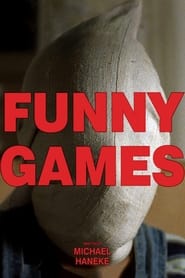Recalls Claude Chabrol's memorable La Ceremonie (1995) in its setup, but the specifics of the Paul bring to mind the droogs of Stanley Kubrick's A Clockwork Orange (1971). Or perhaps it's just Euro-arthouse Scream (1996)?
[One] of the film’s most outrageous scenes [depicts] the nonchalance with which Paul prepares his sandwich [which] is, in some ways, even more monstrous than what’s happening in the other room. But again, Haneke presents us with a stylistic indulgence that cuts both ways. For all its cruelty, this scene relieves us of actually witnessing the act itself. Directors cutting away from graphic, disturbing images is, of course, nothing new, and Haneke is both following in and interrogating this tradition. He has cited directors like Tarantino and their savvy ability to edit around the violence, leaving everything to our imagination. To do it so openly, and brazenly, reveals the nature of the artifice, which is yet another way that Funny Games tickles and teases our most sadistic impulses. Because we are not shown the act, we are able to keep looking. Haneke wants to make an “unwatchable” film—one that disturbs us with its cruelty—but the only way to do that is to make a film that is supremely watchable, one that we cannot simply turn off, or leave.[…]
Funny Games may be simple and sadistic in conception, but it is complex and humanistic in its particulars. That’s why it works so well. The director is unusually attuned to the nuances of behavior, to the subtle shifts in power and affection that people experience in desperate circumstances.
[…]
Denying us catharsis [with the VCR rewind]—or rather, giving it to us and then promptly yanking it away—the movie finally betrays the assumed pact a thriller makes with its audience. And it does so in a way that’s unusually discomfiting: it might be tempting to say that by redoing this scene, Paul assumes the role of filmmaker, but actually, in grabbing the remote and rewinding, he looks more like a viewer—in other words, one of us.
— Bilge Ebiri (Criterion)
Funny Games observes the family's excruciating terror and suffering with the patient delight of a cat luxuriantly toying with a mouse that it is in the process of slowly killing. Posing as a morally challenging work of art, the movie is a really a sophisticated act of cinematic sadism. You go to it at your own risk.
— Stephen Holden (The New York Times)

